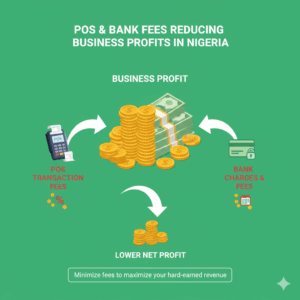If you run a business in Nigeria, you’ve probably noticed that every bank transfer, withdrawal, or POS transaction comes with a small fee. It might seem insignificant at first, but over time, those POS and bank fees quietly eat into your profits, reducing your cash flow and shrinking your business margins.
Understanding and managing these hidden charges is crucial for financial survival. Whether you’re a small retailer, freelancer, or startup founder, learning how to track and reduce POS fees in Nigeria can help you save money, boost your margins, and take control of your cash flow.
That’s exactly what this guide will show you, including how Zaccheus, your AI CFO, helps Nigerian businesses automatically detect, track, and minimize POS and bank fees so you keep more of what you earn.
The True Cost of POS & Bank Fees in Nigeria
Nigerian businesses pay a mix of visible and hidden charges, including:
-
POS transaction fees: 0.5% to 2% per sale.
-
Transfer charges: ₦10–₦50 per customer payment.
-
SMS and account maintenance fees: ₦50–₦150 per month.
-
Chargebacks or settlement delays: costing both cash flow and trust.
When combined, these small deductions can add up to tens of thousands of naira monthly, especially for high-volume merchants.
How These Fees Eat Your Profit Margin
Let’s say your business processes ₦5,000,000 per month in POS payments.
If you’re paying an average 1.5% POS fee, that’s ₦75,000 gone before even accounting for transfer or maintenance charges.
Those fees are hidden costs that reduce your real profit margin. You might think you’re operating at 20%, but after accounting for fees, your true margin may be closer to 12–15%.

How to Diagnose the Problem
Before fixing it, you need to understand where and how much you’re losing. Here’s a simple diagnostic checklist:
-
Download your bank or POS statements for the past 3–6 months.
-
Categorize charges (POS, transfers, SMS alerts, maintenance).
-
Sum total deductions per month.
-
Compare fees vs. total revenue to see their percentage impact.
-
Use Zaccheus to automate this, it categorizes and highlights recurring bank fees instantly.
Smart Ways to Reduce POS Fees
1 Negotiate with Your POS Provider
Many POS companies allow rate adjustments if your monthly volume is high. Ask for a merchant discount or switch to providers with lower rates (like Moniepoint or OPay).
2 Encourage Direct Transfers
For loyal customers, encourage bank transfers or wallet payments instead of POS swipes, these often cost less or nothing at all.
3 Use Fintech Accounts
Fintechs like Kuda, Carbon, or PalmPay often have lower fees and faster settlements. Compare transaction costs before switching.
4 Batch Your Transfers
If you pay suppliers or staff, batch your transfers to reduce per-transaction costs.
5 Automate Fee Tracking
Manually spotting every ₦10 deduction is exhausting. Use Zaccheus to detect, total, and visualize your POS and bank fees across all accounts automatically.
How Zaccheus Helps You Track and Cut Hidden Fees
Zaccheus acts like your AI CFO, giving you visibility and control over the small fees silently draining your profits. Here’s how:
-
Automatic Fee Detection:
Zaccheus connects to your bank accounts and POS data to track every ₦10, ₦50, or ₦100 charge, categorizing them instantly. -
Fee Diagnostics Dashboard:
See which payment channels cost you most, POS, transfer, or bank all in one clean dashboard. -
Smart Alerts:
Get notified when transaction fees rise unexpectedly, or when your monthly charges exceed safe limits. -
Comparison Insights:
Zaccheus benchmarks your costs against similar Nigerian businesses, helping you identify cheaper banking or POS alternatives.
Profit Recovery Forecast:
See how much your profit could increase if you switched to lower-fee systems or adjusted payment methods.
Case Example: A Nigerian Retailer’s Fee Recovery Story
A Lagos-based boutique discovered through Zaccheus that they were losing ₦85,000 monthly to POS and bank fees. After negotiating lower rates and shifting customers to direct transfers, their annual profit increased by ₦900,000, without selling a single extra product.
That’s the power of visibility.
Summary & CTA
POS and bank fees may look small, but they quietly erode your hard-earned profit. By tracking every transaction and optimizing your payment methods, you can recover thousands each month.
Zaccheus helps you see the full picture, your income, your leakages, and your path to higher profit.
FAQ
Q1. How much are POS fees in Nigeria?
Most POS providers charge between 0.5% and 2% per transaction, depending on your provider and location.
Q2. Are bank SMS or maintenance fees avoidable?
Yes. Some digital banks and fintechs offer zero maintenance fees or digital notifications instead of SMS.
Q3. Can Zaccheus track fees across multiple accounts?
Yes. Zaccheus aggregates all your bank accounts to show your total transaction costs and hidden deductions.
Q4. How often should I review my POS and bank charges?
At least once a month, or automatically using Zaccheus to avoid surprises